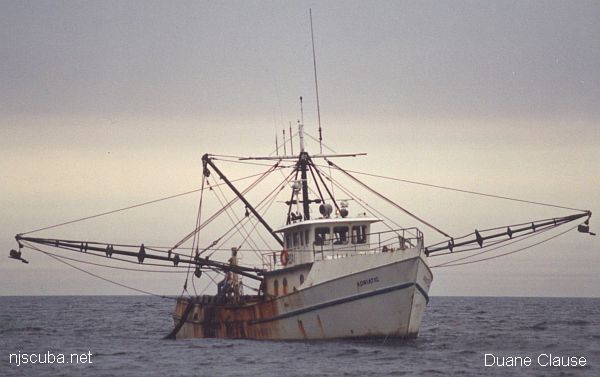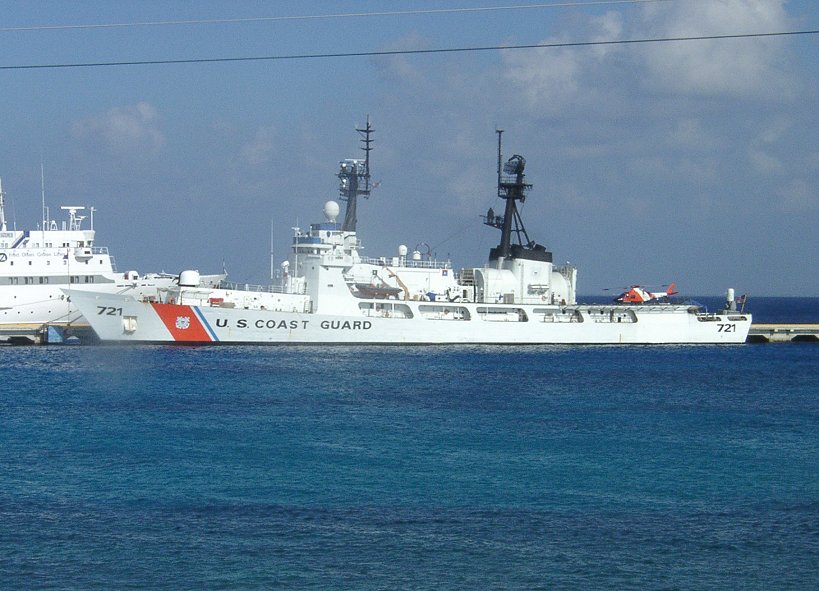Lost At Sea (7/9)
A Rough Journey for the Ellie B
POINT PLEASANT, N.J. -- As Capt. John Babbitt would say later, "weather-wise, it was a pretty nasty night, " with the wind "blowing a freaking gale, and everyone being blown around all night." the surf clam dredger Ellie B (at 65 feet, the smallest boat among a dozen remaining in this port's tragedy-struck clamming fleet) was being tossed as it dredged in 70 feet of water a half-dozen miles off the New Jersey coast. It was Saturday night, Jan. 16, 1999, a night much better spent ashore.
On two such nights during the previous 11 days, the clam boats Beth Dee Bob and Cape Fear had sunk, taking the lives of six men. But Babbitt, 43, wasn't worried. He had been captain of the Ellie B for 11 years. "Me and that boat's been a lot of places together, " he would say. It was a seaworthy vessel, even at 21 years old, and he wasn't worrying about its wooden hull holding together. So time and again, he eased the dredge over the side and lowered it to the bottom while his crew on deck, Jason Wilson, 24, and Gary Sylvia, 45, moved the clams into the cages. It was grinding work, and the men would keep at it until about 5 a.m., when they would have a full load of 25 cages in the hold.
Back on shore, four other men faced Sunday morning and an even more grueling day. The Adriatic, an 85-foot steel surf clam dredger, was ready to put to sea for the first time in a month. In her bowels was a new pump, welded to the hull, ready to shoot water to the ocean floor to stir up the clams that the dredge would then capture and bring to the surface.

Unlike most other boats, the Adriatic had very little machinery. There was no hopper to collect and sort the clams and no conveyor system to move them. The Adriatic's dredge dumped its load directly on the steel deck, and the crew, using coal shovels, scraped the clams up and tossed them through circular holes in the deck to fall into the cages below.
The work was backbreaking. But the money was good, and the setting was loved by all but one of the crew. That one was Frank Jannicelli, 27, who hoped the Sunday trip would be his last. Deeply shaken by the two clam boat sinkings, he had applied for work as a cable television lineman.
Clamming had served Jannicelli's needs. He had dropped out of college and worked in a fast-food restaurant, a gas station and a tavern until his friend, Michael Hager, first mate on the Adriatic, persuaded him to try clamming. He liked the pay -- $340 for one 30-hour shift. But for Jannicelli, a wiry 5-foot-10 man with brown hair, brown eyes and a little goatee, the work was hard, there was little sleep, and now he was scared.
He and his housemate, Amy Cavanaugh, had spent a low-key Saturday night in an Amoco gas station in Toms River where their friend, Dominic Ascoli, worked. They took the television and VCR from their home in Brick to the station and brought a couple of videos -- Lethal Weapon 4 and another flick. They stayed until 5 a.m. and then headed home to flop until it was time for Jannicelli to sail.
George Evans, 51, the Adriatic's skipper, was, for that evening, without his new girlfriend, Joan Nowicky, 44, who was in California on a business trip. Evans, divorced for a number of years with two adopted children and one of his own (all grown), had met Nowicky in a Point Pleasant bar Dec. 30. Something clicked between them. The next night, New Year's Eve, they had dinner at a restaurant and rang in the new year talking through the night at Nowicky's townhome in Brick. Later, Evans would call his sister on Long Island and tell her that he might have finally found the one. On this Saturday night, Nowicky would take the red eye home from California and arrive in the morning. So Evans stayed late at the Adriatic, insisting that Hager and Jannicelli complete some final maintenance.
It was about 7:30 p.m. when Hager arrived at the Brick home of his parents, Richard and Judy Hager, to pick up his son, Mikey, 5. He was covered with the yellowish-orange primer he had been painting on the new steelwork around the pump. He told his father that there were problems with the pump. They had not been able to develop enough pressure while tied to the dock.
Richard Hager, 66, who had been a clammer for 25 years but who now, with a diseased heart, was tethered to an oxygen bottle, suggested that mussels had built up on the pump's intake under the boat during its month at the dock. Michael told him they had been unable earlier in the day to get a diver to check under the boat.
Now Hager had another chore. The Adriatic needed a fourth crew member for Sunday's trip, and before he could take Mikey home, Hager had to find a fill-in. He called the top name on a folded scrap of paper that he laid on the kitchen counter: Douglas Oland, a 21-year-old college student. Oland was available. After showering, Hager took his son home.
Later, Hager's friend since the fourth grade, Sean Domingo, visited with his wife and two children. While the children played, Hager rummaged in the attic and came down with an old survival suit, the neoprene hooded coverall that fishing vessels are required to carry for their crews. This was a suit owned by his brother, Timothy, who had quit commercial fishing to become a milkman. The suit, when properly worn, could keep a man alive in the frigid ocean for a day or more.
Hager explained that you had to be able to get into the suit in one minute to be safe. "Get your watches ready, " he jokingly told his friends. "Now go!" He took the suit out of its orange bag and shoved his feet into the legs, pulling the body up to his waist. But then he began struggling with the zipper. The minute was up, but the zipper wasn't, and Hager laughed. "I'd be dead now, " he told the Domingos.
Of those who would board the Adriatic in the morning, Oland was the least experienced. He was a student at Keene State College in New Hampshire, where he majored in environmental studies. He had worked on party boats and was a certified scuba diver and a surfer. But he had made only one trip aboard a clam boat. Now he was home on semester break and was hoping to make some extra money for school. To do so on the ocean was, for Oland, a bonus. "Every time he looks at the ocean, he feels, he gets this magnetic feeling, " said his father, Robert Oland, of Bayville. "If he looked at the ocean, it would give him a sense of peace that would last for the rest of the day."
While the crew of the Adriatic prepared to ship out the next morning, the Ellie B was making five-minute drags across the ocean floor at 2 to 3 knots that night. The deckhands were sprayed with salt water, whipped by winds, and tossed by waves as Babbitt searched for surf clams. The hunting was a whole lot better here, off the New Jersey coast, than in the boat's home waters off New England.
"In Jersey, there's clams everywhere, it seems, " said the Ellie B's owner, Louis Lagace, 47, of Tiverton, R.I. "But in Nantucket, you could look for hours and hours and catch nothing." Lagace had been skipper of the Ellie B before he bought it. Then, he hired John Babbitt as captain. "He's loyal. He's extremely hardworking. He's conscientious. He's smart, " Lagace said. Babbitt, a high school dropout, fit Lagace's definition of the typical fisherman.
"Fishermen are like one of the last truly American type pursuits, " the owner said. "Whereas a man without even an education could start working on a fishing boat, he's learning mechanics, the ocean, the weather. He can work himself up. If he's a good deck hand, somebody will take him. If he works hard, he can become the mate. Then captain. "Then, if he saves his money and doesn't drink it or use it on drugs, he can get his own boat. This is the American dream."
John Babbitt, living that dream, finished fishing for surf clams with two hours to go before sunrise on Sunday. His crew stowed the dredge in its ramp on the Ellie B's deck, and, exhausted, the captain collapsed on a bench in the wheelhouse and was soon in a deep sleep. The autopilot steered toward Manasquan Inlet, and the crew stood watch. After a rugged night, the sea was settling and the ride promised to be smooth.
As was the practice, Sylvia roused Babbitt when the breakwaters of the inlet were a mile ahead so that the captain could steer the boat into port. It was 6:31 a.m. Sunday, and the sneaking gray light of dawn had brought the eastern horizon into view behind the Ellie B. To the west, the street lights glowed along the coast, New Jersey's beaded necklace.
Babbitt got up and sat in the chair before the wheel, the autopilot still doing its work. Then Sylvia and Wilson, confident in their captain, lay down on the wheelhouse benches and fell asleep. The boat was making about eight knots. It would be at the inlet in seven minutes. But the exhausted Babbitt was not awake. He had sleepwalked to the helm.
It was the awful sound of shattering timbers that brought the captain to his senses. He looked down. The floor was buckling and water squirted around the edges of a trap door to the engine room. The Ellie B had rammed head-on into huge concrete structures -- similar in shape to a child's jacks -- that protected the end of the inlet jetty. The rear of the boat was sinking quickly.
Babbitt yelled for Wilson and Sylvia to get into their survival suits as he jammed the throttle forward so that the engine would keep driving the boat against the jetty. He had time to grab the radio microphone and yell: "Mayday, we hit the wall. We're going down." By that time, the water had risen to the knees of Babbitt's survival suit, which was halfway on. He finished the job, and he and his crew stepped out into the calm, cold ocean.

